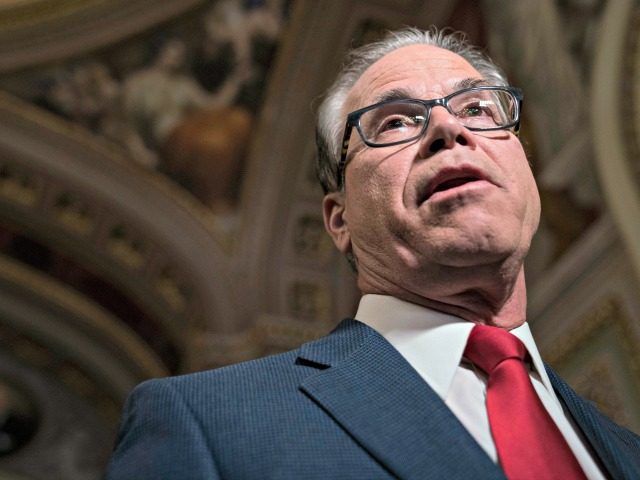Indiana Sen. Mike Braun (R) says now is the time for Republicans to embrace a healthcare strategy that emphasizes “transparency and competition.”
In an interview with Breitbart News, the business owner-turned U.S. senator spelled out that Republicans must stop being apologists for the healthcare industry.
“So, I’m talking about competition, no barriers to entry, full transparency, and an engaged, healthcare consumer,” he described as essential characteristics of the strategy.
Braun summarized his plan to lower the costs of high-quality health care for Americans, based on what he did when he was CEO of his company, which sold and distributed truck parts.
“I devised a plan … in my company, which is now a fairly large one,” Braun explained. “We did not have a premium increase in 13 years, and actually cut a family’s costs by 50%. We made it to where we emphasized wellness, not remediation.”
Braun said his plan to lower the costs of high-quality health care had no barriers to entry (meaning employees with pre-existing conditions were not excluded), full transparency of costs, and employees who became healthcare consumers.
The senator’s comments come as the U.S. Supreme Court agreed Monday to hear a Republican challenge to the Affordable Care Act (ACA), aka Obamacare, which could result in the repeal of the Obama administration’s signature legislation.
Additionally, Democrat presidential candidates, such as Sens. Bernie Sanders (VT) and Elizabeth Warren (MA), have been running on government-run Medicare for All plans that further government involvement in every American’s health care and work to keep Americans in the dark about costs as they also raise taxes.
Braun said one of the most difficult obstacles to overcome is changing how Americans have viewed health care – as a benefit that comes with employment.
American workers have been receiving health insurance through their employers for decades, since the U.S. government exempted employer-paid health benefits from wage controls and income tax during World War II.
Braun said that, as a result of this employer-based system, Americans have grown accustomed to obtaining health care services without even knowing the costs – and not caring to know those costs.
“It has to be consumer driven in an industry that embraces transparency and competition,” Braun asserted.
The senator explained further that all sectors of health care have contributed to high costs:
So, it’s across all sectors of health care. Pharma is the highest profile – that is generally 15 to 20% of the healthcare dollar. Hospitals are 30%; practitioners, doctors, nurses, somewhere around 30%.
And insurance companies are kind of the Darth Vaders of health care because they devised a system that does not embrace transparency and has all kinds of cloak agreements with the providers themselves. It makes it difficult for the real stakeholders in health care – which are business owners. When you hear people saying they love their private insurance, most CEOs of companies – that aren’t healthcare-related – don’t, because they pay most of the premium. So, you’re getting a lot of employers who are starting to say, “Hey, enough is enough!”
Braun said his company grew large enough to self-insure.
“It did what everybody should be able to do,” he said. “There should be no single payer policies. You should be able to associate and pool to have the benefits of what a lot of companies do.”
The senator said some companies still “don’t give enough incentive for their employees when they engage the healthcare system to have skin in the game.”
Braun said Republicans need to go on offense in offering a health care strategy that emphasizes both transparency and competition, and noted that, when he was CEO of his company, he accomplished that even while he covered pre-existing conditions.
“Republicans have been apologists for the healthcare industry, because they confuse it with free enterprise,” he asserted. “They so often refer to the free market. There’s nothing free about healthcare.”
Braun said Americans still “have no idea what they’re paying for until they get their bill two months later.”
He added that much of the narrative on “pre-existing conditions” is “jibberish that gets promoted by health insurance companies mostly”:
That’s because, sure, if they cover pre-existing conditions, they’re gonna make less money. But, they made so much money on our plan of 300, that when I became the insurance company, I saved almost 20%. And then I got rid of copayments, to where all my employees are shopping around from dollar one, and then I really protected them on anything significant, accident or health-wise. All of a sudden, costs started cascading down.
“I covered pre-existing conditions, with no caps on coverages 13 years ago,” he explained. “It can be done; you can afford to do it. Even in my plan, I had 1000 employees – we had 300 when we started.”
“We saved almost 50% out of the gate,” he added. “And we were mostly profiled with young unmarried males. Now, they’re all married with families, and it has still saved us tons of money by doing what I talked about.”
Braun said he is encouraged that some Republicans have started to become more aggressive about health care.
“President Trump has actually been the most aggressive individual on health care, but every time he does an executive order, it goes to court the day it becomes effective,” he observed.
“But we need to quit apologizing for an industry that does not participate in free markets with the characteristics I talked about,” Braun concluded. “And don’t let the Democrats out-maneuver us in a way that would push us to a political solution with a business partner named Bernie Sanders.”

COMMENTS
Please let us know if you're having issues with commenting.